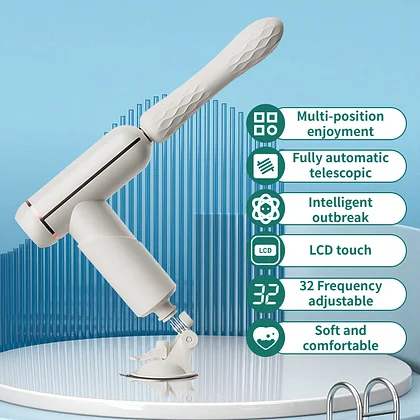In the realm of human sexuality, curiosity often leads us to explore the intricate nuances of desire, pleasure, and satisfaction. One such inquiry that frequently emerges is whether women are inclined towards sex machines. This article delves deep into this provocative question, aiming to uncover the truth behind female sexual preferences and dismantle common misconceptions.
Understanding Female Sexuality: Beyond Stereotypes
Before delving into the question of whether women like sex machines, it's imperative to dispel the myth of a monolithic female sexuality. Just as with thrusting Machine , female sexual desires, preferences, and fantasies vary significantly from one individual to another. Attempting to generalize women's preferences undermines the complexity and diversity of human sexuality.
Exploring the Appeal of Sex Machines
Sex machines, also known as mechanical sex aids or robotic sex devices, have garnered attention in both popular culture and the realm of sexual wellness. These devices range from simple mechanized dildos to sophisticated robotic partners designed to simulate various sexual experiences. The appeal of sex machines lies in their ability to provide consistent stimulation, precision, and novelty, catering to a spectrum of sexual preferences and desires.
1. Consistency and Precision
One of the primary attractions of sex machines is their capacity to deliver consistent and precise stimulation. Unlike human partners whose performance may vary, sex machines are engineered to maintain a steady rhythm and intensity, ensuring a reliable source of pleasure for users. This consistency can be particularly appealing for individuals seeking predictable and controlled sexual experiences.
2. Exploration of Fantasies
Sex machines offer a platform for individuals to explore their deepest sexual fantasies in a safe and controlled environment. Whether it's experimenting with power dynamics, incorporating elements of BDSM, or indulging in unconventional fetishes, these devices provide a non-judgmental space for exploration. For women who harbor fantasies that may be challenging to fulfill with a human partner, sex machines offer a liberating avenue for self-expression and satisfaction.
3. Independence and Empowerment
In a society that often stigmatizes female sexuality and places restrictions on women's sexual agency, sex machines can serve as a tool for empowerment and autonomy. By embracing technology to fulfill their sexual needs and desires, women assert control over their pleasure without relying on external validation or approval. This sense of independence can be profoundly empowering, fostering a greater sense of self-confidence and sexual liberation.
Challenging Stigma and Misconceptions
Despite the potential benefits and appeal of sex machines, they continue to be surrounded by stigma and misconceptions, particularly regarding their suitability for women. Society's discomfort with female sexuality often manifests in skepticism or moral judgment towards women who embrace sexual technology. However, it's essential to recognize that the use of sex machines is a personal choice and a valid expression of individual autonomy and desire.
The Role of Communication and Consent

As with any aspect of sexual activity, communication and consent are paramount when incorporating sex machines into intimate encounters. Open dialogue between partners ensures that boundaries are respected, preferences are acknowledged, and mutual pleasure is prioritized. By fostering a culture of consent and communication, individuals can navigate the use of sex machines responsibly and ethically, enhancing their sexual experiences while prioritizing respect and empathy.
Conclusion: Embracing Sexual Diversity and Exploration
In conclusion, the question of whether women like sex machines cannot be answered with a simple yes or no. Female sexuality is complex and multifaceted, encompassing a diverse range of desires, preferences, and experiences. While some women may find pleasure and fulfillment in the use of sex machines, others may not feel inclined towards them, and both perspectives are valid. What's crucial is fostering a culture that embraces sexual diversity, encourages exploration, and prioritizes consent and communication in all sexual encounters. By dismantling stereotypes and challenging stigma, we create a more inclusive and empowering environment where individuals can embrace their sexuality fully and authentically.
